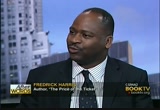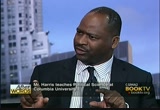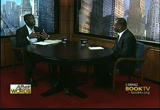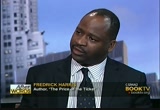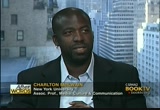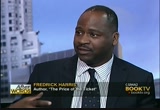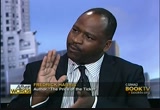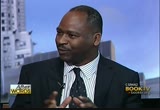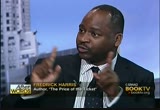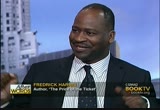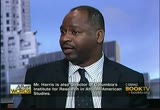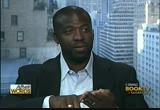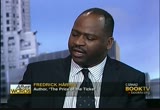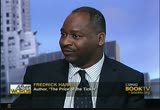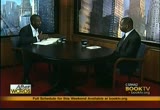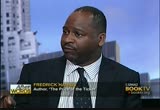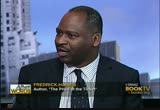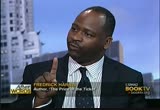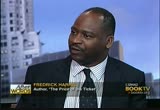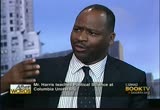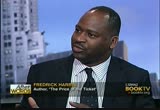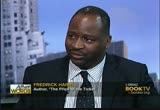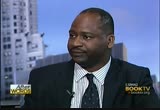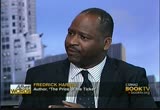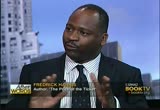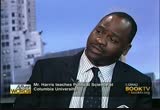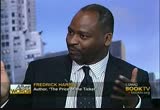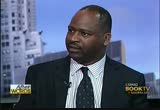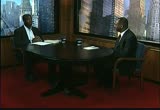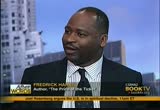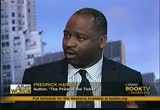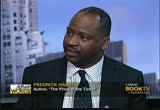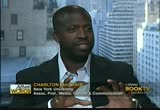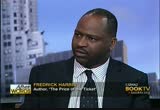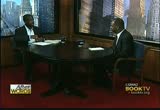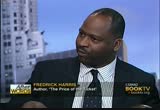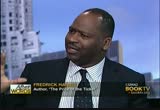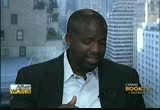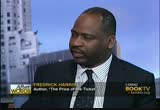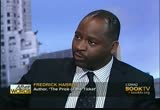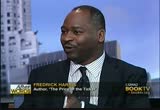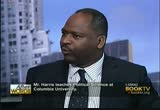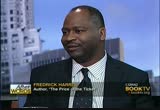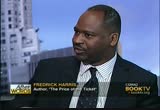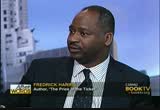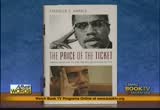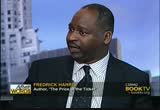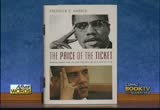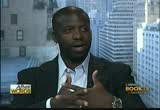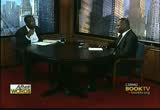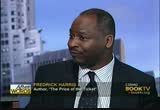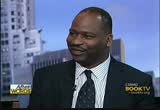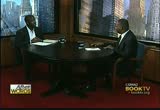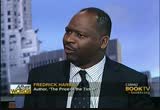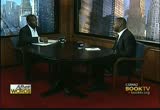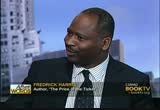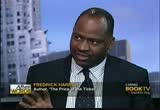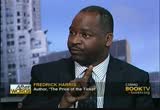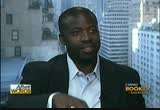tv Book TV After Words CSPAN July 28, 2012 10:00pm-11:00pm EDT
10:00 pm
10:01 pm
decade i think i went to have my say, so in this book, what it's really about is providing a historical context for the rise of barack obama and looking at the various campaign strategies that racially neutral lack politics and black politicians have been using and talks about the consequences of those strategies for present-day black politics. >> host: okay so you would say it's more than about obama though, the central theme, it's about a lot more? >> guest: it's way a lot more. i think history is very important to sort of figuring out what's going on at the moment and so not only is it about the grounding rise of obama within history. i talk about sort of shirley chisholm and jesse jackson campaigns and i talk about chicago politics starting way back in 1928 with the first black congressman coming from
10:02 pm
the south side chicago and i talk about the ideological fissures within the black communities around liberation theology, prosperity, gospel and this long history about the politics of respectability, looking at sort of the need of black communities to raise up what i would describe as the untalented 910th within the black community to present a positive face to america, to white america about racial progress and so the rise of obama is within all these context, it sort of is to explain the 2008 race and what obama did as a candidate particularly when he faced issues of race. it has to be anchored in this trend, this ideological trends that are developing within the black communities in the history that the rise of rice of his campaign came out. >> host: tell us a little bit before we get into some of the details of the book that you
10:03 pm
spell out nicely there and we are going to touch on both of those, tell me a little bit about what it was like to write the book and to do research for it. you make note -- though you are a political scientist. often political scientists are stuck on my our numbers and our stats in the present time. what was it like for you to look back in a historical context? >> guest: that is an excellent question, because this was a very different book for me to write. i am pretty much an unconventional political scientist. i run statistical models. i do survey work and i may do a little ethnography here in their and my book on the black church but basically i'm looking for statistical rigor and theoretical contributions. but i really felt in many ways that the work that i have done hasn't really spoken directly to
10:04 pm
the issues that i think are important to black politics and i think it's really crucial at this moment, because i think there is a lot of amnesia going on about what those political struggles meant for black communities. and so, it was inspiring in many ways and a little bit fun to sort of go and think back decades before to the history, to sort of put together all the interesting characters and places like chicago and there are plenty of characters that i wrote about and couldn't write about because i didn't have the space so it was just a really fun book to do and it really got me out of being the sort of normal political, sort of normative neutral political scientist. >> host: alright, let's start at the beginning. starting off with chapter 1 talking about this idea of the class. tell us a little bit about what that is. what is the primary distinction
10:05 pm
or fissure in black politics in this chapter? >> guest: the big difference and i want to be clear it's not just black politics. right in the mid-1960's when we have discussions about voting rights and the voting rights bill, black leaders and black people began to talk about what their vision of black evil in politics and electoral politics should look like. on the one side you had malcolm x and his famous speech the ballot for the elect where he talks about black voters should not be taken for granted, that there should be basically community centered issues that matter, no matter what the color of the politician is and those politicians should be held accountable based on what they did or did not do in the interest of the community. on the other side you had a more
10:06 pm
coalition focus perspective in and in a famous essay he wrote in the 1960's from protest to politics. he really was trying to steer the protest movement into electoral politics as a part of lack voters becoming a part of the democratic party coalition. from southern voters coming in and northern black voters who were already ready much electorally active within the political party, and so that vision of coalition politics included the idea that issues, concerns should be in many ways a universal perspective and that blacks should join coalitions with labor movements, with sympathetic whites, liberal religious organizations to provide policies that would be very important.
10:07 pm
not that they gave up on antidiscrimination legislation and the importance of that's it this has been the big clash and the clash as we see in this first chapter in many ways crystallized what shirley chisholm running in 1972. there are tensions between independent black politics and the coalition focus because she announces her campaign in brooklyn at a church. i'm not the candidate lack full. i'm not the candidate of women. i'm here to serve the interest of the people so she was thinking in coalition terms, but she didn't do very well. >> boats go i want to ask you to backup or just a moment. one of the things that immediately catches my eye in this there is that stories that take us back to 1971, the chicago hotel room where this meeting convenes. >> guest: this is a
10:08 pm
fascinating story. it's almost like a mystery movie. what you have is a secret meeting that happens in chicago. 1971, and you have black elected officials, meir hatcher out of gary indiana, the first black mayor from a major american city is a part of this, julian bond, percy sutton, you know a staple in new york city black politics. over 100 black officials meet outside of or near all hair airport outside of chicago and what you have is -- they don't want the media involved and what they are doing is going there to deliberate on the need to run an african-american for president. there are some people who are opposed to it and there are some people who are for it. some people think there is a
10:09 pm
better strategy to pick the most liberal and viable white candidate who will be accountable to the black community if he is elected. you have some people say no, we should include jesse jackson and 71. no, we should run a black candidate and then we know that percy is going to win but we want to use the votes that the delegates that are accumulated as leverage in the community so we can get you know, get policies, issues that are important to us. and so all of this leaves the next summer in 1972 to the national black lyrical convention in gary, indiana where you have all these black delegates at the black cola -- political -- some of the stuff is universal policies like health care and mary baraka is a
10:10 pm
part of this. his famous speech, its nation time, its nation time, its nation time. so he has this grassroots efforts to place on, to place black issues on the electoral agenda in politics and so what we have here is the shirley chisholm who doesn't go to the meeting at o'hare, near o'hare airport rather but she just jumps in herself. >> host: and someone else gets elected. >> guest: right, with a candidate and so there was also tension about brokering. people have an interest with going with a political candidate because they might personally benefit from their association so there's a lot of drug ring that is going on but surely sort of hopscotched over that and when she announced she was running, she did it and some people oppose her particularly
10:11 pm
the men who were very sexist, black politicians in particular who thought that a black man should be the first to run in the democratic riemer he. but there were lessons that were learned from that experience and she talked about those and what's important is it laid the foundation for jesse jackson's campaign and jackson's campaign i would argue lay the foundation 20 years later for barack obama's ascent. >> host: that is a little bit about what i want to ask about starting with shirley chisholm. and aspiring figure but when you look at it in terms of sort of the typical measurements of political success, she number one ran without any kind of sanction from the black elite. she was unable to get very many black delegates. when she tried, after humphrey released his delegates at the convention and she tried another play to try to amass delegates,
10:12 pm
she was unsuccessful there. and ultimately she was unable to translate any of that into kind of tangible leverage by the democratic party nominee that year. so by all accounts she was a failure, and so tell me why it is her candidacy was so central and why it paves the way and why it was sort of first chapter in the story that ultimately ends up with barack obama? >> guest: it was the carrier but what it did is, it gave african-americans for the first time experience and presidential politics. and so these players in the background, particularly jesse jackson, seemed to pop up at key moments and in post-civil rights black history. they kind of knew how things
10:13 pm
were. they learned from the failures of that experience, and but also, i think as shirley chisholm said herself in her memoir that she wrote that was published to your later, is that she was the first, not only the first african-american and the first woman. it's a disappointment in many ways that in 2008 when we had for the first time a viable woman running for president and a viable african-american running for president, shirley chisholm was hardly mentioned by the media. the candidates themselves, but despite that, she was the first. she took the sexism that came after her on the chin as well as the racism. she liked barack obama and jesse jackson and they did and talk about this in the book but she talked about it in her memoir, her life was threatened, because she was running and in fact wallace was shot.
10:14 pm
she came to that criticism for -- she came to a site to offer comfort even though ideologically they were on opposite ends. and so, i think there always has to be a first. there were people who attempted before jackie robinson, right, so we also -- the ones of paved the way and made it easier. a sacrificial lamb i would say. >> host: i want to read the value i think at least one of them in this historical approach of looking through archives and raking up that path as you come across things that most people have never read or heard of at all in their lives. i want to read this quote to you about chisholm. and the sexism, the racism, her ability toace that and overcome it. one of these comments came a
10:15 pm
thing from a journalist at the time. though her quickness and animation leave an impression of synonym of the she is not dutiful. her face is bony and angular perk or her nose is flat and wide. her neck is scrawny. her perch hitting -- probably accounts in part for notable -- notice the list. in her autobiography she describes herself in a much more favorable light. i can imagine by any stretch of the imagination something like that bing said about hillary clinton in 2008. so maybe just say, wrap up a little bit about chisholm, a little bit about what that tends to be not only the first african-american for the first woman and to take on that kind of the tree all at that time and its influence on successes, female and black caucus. >> guest: here is a great
10:16 pm
example of how shirley chisholm stands at the intersection of racism and gender inequality, and it tells us how far this country has calm. that was pretty much par for the course in the late 60's and early seventies as the women's movement is being galvanized. what i describe in the book as this hard-earned document, this description of this woman, i just could not imagine what that meant to her psychologically, what it did to her morale. why is it that particularly during this era of black power that he didn't have male, black males within the black community coming to her defense and making descriptions of her like that. in fact, she had to fight two fronts. chicago, the center of the black
10:17 pm
clinical world, so she goes to black expo in chicago on a panel about women in politics. and she basically says, she is taking all of this stuff about her as a woman running and by the way she is the first black woman to be elected to congress so that is a very important fact to know. but she said look guys, get off my back. a-,- women. we are all tied in this sense of making progress, both black men in black women. she had to fight on both fronts. she had a male colleague in a professional black caucus, when a reporter would ask what you think about shirley chisholm, shirley who? the other one rolls his eyes and the reporter would not even respond. so she has come a long way and i don't think, think it would
10:18 pm
be -- oops those that are ingested in addressing issues around race and gender to forget the sacrifice that shirley chisholm made in a particular campaign. >> host: absolutely. let let step ahead another 12 years, after shirley chisholm and we have of course jesse jackson. let's start, tell me a little bit about how jackson's campaign differed from chisholm and how he has a candidate differed in terms of the strategy and what he thought could be accomplished at the very beginning? >> guest: by the 1980s, in many ways 76 is sort of a an band election where sort of black leaders, black voters really get behind the governor's of georgia and he gets these endorsements from people like
10:19 pm
andy young, the mayor of atlanta, a colleague of dr. king, corrective scott king also and so black leaders are getting behind her because they don't want another year of presidential administration from the republicans. by 1980, and there is a year that also passes, it but i 1984, he was the rain of the reagan administration, the rising tide of conservatism, and because of the democratic party not opposing these policies, lack folk are getting very impatient. they are feeling that they are being taken granted by the democratic party and there are renewed discussions, some of the same players in 1972 but new players because there is a new
10:20 pm
type of black elected officials, mayors in philadelphia, chicago, and harold washington was selected the year before. jesse jackson is raising the banner of independent lab politics. it's our time now. we want our share. than so what we have here is a split that we will see later on among those who think that this is a good strategy and those who go with sort of mondale or the regular sort of white liberal democrats. and ironically enough, most black elected officials, most of them in the black congressional caucus are opposed to the jackson candidacy but there is a rising tide of grassroots activists. jesse gets a majority ed the black vote but hardly among white voters so what we have here is this idea of using the
10:21 pm
black vote and an accumulation of delegates as a leverage to get the democratic party to sponsor these progressive issues that they seem to be neglecting in the black communities. >> host: so jackson's campaign starts in many ways like chisholm's as one might say a symbolic effort. that is, no one thought he was going to win and he himself didn't think he was going to win, but the effort was really about as you say, amassing those delegates and using that as a way of gaining some influence and power within the democratic party. >> guest: yes exact them by putting issues on the table. you know, issues around the primary system, a runoff system in the south where the majority of the candidates have been, at least 50% of the vote, a runoff has to take place and racially
10:22 pm
polarized districts whether congress or you know, city council district, this would be a disadvantage to black candidates because they would get a plurality and not a majority and so when there are 212, usually oftentimes the black candidate with -- so if he wants to get away from the primary system and also the antiapartheid movement is going on so he is also pushing the democratic party to address those issues very aggressively as ell. and so it was using the electoral process and presidential election to set the agenda, and so guess they were partly symbolic but there was substantive aspects of it. not necessarily to become the first black president that issues on the agenda and onto the platform and have the
10:23 pm
democratic party address those issues. >> host: he specifically targeted the black community which was the essence of the independent black politics. >> guest: exactly, exactly. >> host: so 84 to 88, what changes with respect to the independence, the coalition and -- >> guest: so we have an 84, it's our time now. we want our share. in 1988 is the rainbow coalition and so you see that the tensions and the strategy, and i have to say before jesse jackson given his history, it was really pretty much a successful strategy in the sense that you know, he didn't win but for a few weeks people thought that he may win the primary. he won the michigan primary for instance and overall he got 20% of the white voters and he
10:24 pm
partly changed his strategy. you know he talked about working-class voters and he spoke to white working-class voters about issues around bank closings and i didn't say this in the book, but particularly in a speech he gave and 88. he was the first democrat running in the primary who spoke out for and rights so 20 years later we will see a different outcome. again, it made the platform for a very progressive coalition that would develop later on, but also you know he didn't get much out of it. part of the strategy you know is that even, where the go from a coalition or you use the coalition strategy or the independent lack strategy, you still have to say the american public because black voters --
10:25 pm
democratic primaries but you know all democrats shift and become much more moderate and so democrats have been moving in the 80's to republicans so in the end in many ways the matter with the strategy was, there was a lot of soul-searching in the party and rise of a lot of democrats but it would have implications for barack obama. the rules change within the democratic party about the proportionate representation in the allocation of delegates because this is a big issue of jesse jackson both in 84 and 88. he thought it would be an advantage because you know the large states for instance, had all these delegates for the rules very. you had to get a certain amount. if you got 20% of the vote, you would get 20% of the delegates.
10:26 pm
so part of the negotiation that the party agreed to in 1988 is okay, we will make across the board the process more fair and we will make the allocation of the delegates more equal. so why that is important in 2008, when hillary clinton was winning big states like texas, california, ohio and pennsylvania and barack obama was winning smaller states, and even though hillary won sometimes over 50%, winning over 50% of the vote, barack obama got a share of the delegates and some estimated that, if if the jackson rules were not in place, perhaps barack obama wouldn't have gotten the nomination in 2008. >> host: it was pretty close.
10:27 pm
>> guest: very close, very neck-and-neck. you also have the public officials and they were split down the line too because it there was this epic a tool in the primaries. but i think people sort of forget and even though jesse jackson is sort of the coalition type strategy in his negotiatiot independent black politics. we have all these delegates and this is a process that is unfair to candidates in general, particularly for this candidacy and there'll be seven or issues so we are going to use the leverage of these mostly black delegates to get this one policy change within the democratic party. and so, poor jesse because in 2008 he will be remembered for making those unfortunate comments on "fox news," but as i say in the book, i don't think
10:28 pm
you know we shouldn't forget the movement itself even though there may be problems with the messenger currently and perhaps even then. that mattered. that set focus on the leverage and had consequences down the line that i don't think jesse jackson himself could see. >> host: and which president obama direct benefited from an probably wouldn't have been president maybe had it not been for that. >> guest: it certainly didn't hurt. >> host: chisholm, jackson and a multitude of black candidates in between all paved the way for obama, for barack obama's rise in the election. in a second we are going to get to chicago and the crucial role that played in the people there played that before we get into
10:29 pm
that we are going to go do a quick break in we will be right back. >> host: chicago, you mentioned in the book that it was some most destiny that our first black president would come from the city, from the state. tell us a little bit about why that is and the role that chicago politics played not only an elevation of bravo, but in terms of helping to ferret out this distinction and conflicts between independent and coalition politics. >> guest: as a say in the title of that chapter, chicago
10:30 pm
is the political capital of chicago and particularly the south side of chicago with the four u.s. senators tha have persisted or lease since reconstruction, you know, and most of them are from the south side of chicago. senator barack obama, and then the gentleman who was put in to replace him, all african-american. it's really a part of the paradigm of the city itself in so many ways. chicago has long been one of the most racially segregated cities in america, and so it's a paradox that segregation has led to this very compact, to mostly large black communities on the west side of chicago and particularly on the south side of chicago that have
10:31 pm
continuously delivered large numbers of black supposed for democratic party candidates and so that is one of the paradoxes of why it has this political strength. the other is that the role that blacks have played within the democratic party machine, and they rebelled from the machine particularly starting in the 1970s but many like washington who went on to become mayor started out in the political machine in daly was elected in the 1950's. and the machine itself would perpetrate to its public housing policy, as city planning policies. the dan ryan highway split the south side at one time and a one-sided majority black community and the other side majority white community, so there were efforts to contain
10:32 pm
the black population on the south side mostly because of the efforts of the daly machine but within the machine, blacks began to learn how the political process worked, so many of them like mayor washington, became what i decide -- described as renegades. they use the clinical skills they have developed within the machine to oppose the machine itself. we see again this contradiction in the political capital of america but also has a legacy of segregation that put all the black folks together in the neighborhood and also because of the voracity of the political machine and how many blacks who oppose the machine -- to oppose it. >> host: so you have this concentration which turns into considerable power or leverage,
10:33 pm
so the question is, and is this the way you see it, that really divides philosophically, strategically is whether or not to play the game within the machine or to oppose it. >> guest: that is part of the division and the independents the way i describe it is a little different because the independents i talk about in national black politics you know, those independents who seek a community centered as opposed to a coalition, but there are also colin shin as to where wear black in chicago who were independent from the political machine. so we had two types of independents who sometimes collaborated with and sometimes clashed. i can talk about in a moment where sort of a rock obama sort of fits within that tradition.
10:34 pm
but clearly, because of the racist nature of the daley rashean, because of the long efforts around police brutality in the city of chicago are respected as voters. when it came to select a viable black mayor all these came together to elect harold washington. >> host: so you have the split and maybe you could elaborate a little bit more. so you have independent black politicians who are independent and that they are trying to gain tangible policies, targeted policies that benefit black americans and usually a black nationalist and in their ideology and chicago. >> host: so a black nationalist strain or philosophy
10:35 pm
fuels that. on the other hand you have people who are also independents but they are independents because they are working outside of -- >> guest: the machine, right and they tend to be more coalition focused in their approach to politics. >> host: these are the hyde park -- >> guest: hyde park where barack obama is from that tradition of being separate from the machine. >> host: alrightalright, so harold washington, tell us a little bit about where he stands from the beginning to the end. what really makes him a kind of a central, independent black nationalist kind of candidate? >> guest: harold washington i think is a brilliant politician, a great orator, and he really laid it on the ground of what the implications were about that election. and you have to be virtually
10:36 pm
dragged into running. there was a whole movement prior to getting him to run led by a mostly -- led by activist william palmer who i talk about in the book. he is a political activist and not a political advertise -- so harold washington i would say was on the border between the black gold nationalists as well as the traditional independents because he had experience. he had tried to work in the machine to make drug arrests. he ran earlier in the 1970s and there were some sort of black machine politicians who went along with the white machine candidates that year. harold washington called them the biggest uncle tom on god's green earth which is the type of black nationalist rhetoric you don't normally hear but you also
10:37 pm
saw a coalition because black voters were only 40%. he talked about the needs of the coalition however he never let up on his criticism of racism that existed in the city as well as a the need to dispense resources equally throughout chicago. and so, he is on many ways on the border between the hyde park type liberals as well as the black nationalist type liberals and chicago political machine. >> host: i want to talk about that aspect of talking about race, racial inequality that seems to be from your point of view really the central key to the independent black politics, the idea that the matter what happens whether we try to make coalitions or work within the community, that idea of racial inequality is centerstage. i want to read another one of these gems of the quote that you have in the book and this is from harold washington and i
10:38 pm
think this setup is that he has asked basically if he embodies the good qualities of past eras and this is his response. there are no good qualities of past mayors to be had, none, none, none. i regret anyone dying. i have no regrets about the leader. he was a racist from the court, head to toe, head-to-head. there is no doubt about it and he thoughts and some thought that was the way they were supposed to live. just like some slaves on the plantation thought that was the way they were supposed to live. >> guest: right. >> host: i can't imagine anyone today saying quite clearly that. >> guest: no, no, no and what's interesting particularly david axelrod actually worked with harold washington when he ran for re-election in 1988, and
10:39 pm
oftentimes, we hear, particularly those who are talking about barack obama and how he we came from chicago politics, that he is basically of what the extension of harold washington did which is to some degree, he is. i like to look at it that he inherited the benefits of that. i could not imagine those words coming out of the mouth of a rock obama. when he was in chicago or of course since he has been on the national stage but i think it's important because it was not -- is recognizing with this issue is all about but is also talking about policy. he talks about jane byrne the incumbent, who is being challenged in 1983, who does all these horrible things policywise and says i will try to prevent jane byrne from
10:40 pm
institutionalizing racism. in-your-face, but he also went to white people and he talked about what provisions would be and he talked about sort of you know what he planned to do. he went to the latino community who were supportive of his campaign, and it was because of that coalition -- now the coalition, it was almost like the rainbow coalition. there was lots of black but a few other colors, but he was able to, with the black mostly coalition and brown latino population, then relatively small in chicago, and a few white liberals put him over the 50% mark and most of the white voters in that city went with independent white candidates who were democrats. indeed one was president in 1980 to the cook county democratic party and ran as an independent
10:41 pm
against the mayor of the party. this is how much verbal was going on and there was a counsel for that when then that really looks like what president obama is going through with it republicans today. think about that. and so he had a hard road to hell and sort of navigating his environment, but he did not ever let up on issues regarding the need to challenge racism and also the persistence of racial inequality in that city. >> host: but he did lament the fact as you mentioned at the end of this campaign, after all the work he did and all the trying, with that coalition particularly with whites. he had hoped there they would be much more -- >> guest: i got the story actually from david rohde fax david axelrod. in the interview he had done in
10:42 pm
some newspaper stories he talked about working with harold washington and how he and others were so excited in 1988 when they got 20% of the white vote. harold washington, when most people, most white people identify in the city of chicago as democrat at that time and not quite double but almost double what they did in 1983. and harold washington to spend 90% of his time in white neighborhoods trying to convince these white voters to vote for him said, and i will say it on public television, ain't it a -- to be a black man in america? he lay that aside. he got up the next morning and gave a great speech told them how great chicago was in that he was ready to serve another year. this was in 1987. unfortunately months later, i
10:43 pm
will never forget it, in november of 1988 he died of a heart attack. >> host: that's a shame. carol moseley-braun, she sets out to build the same type of coalition that harold washington did that much more successful amongst whites. did she do that at the expense of talking about racial inequality? >> guest: she didn't run away from it, and what was interesting about that moment in 1992 is that she built a coalition, and she also had been a countywide elected officials so she had gained support of many white voters, but this suburbs, particularly in the northern part of chicago called the colored county, were there
10:44 pm
because of what was happening around the confirmation of clarence thomas and the outcry from the sexism or accusations of sexism that were going on, meaning women voters and collier county ran, not because she ran on issues around issues of sexism and gender inequality but she also had a base and a record on the south side of chicago. she is also from the south side of chicago. and maybe she didn't talk about it as much, but you know carol moseley-braun never ran away from issues when it came to racial inequality, so that was pretty much of a record there. but she built on the coalition that harold washington builds on so you could see the progression and in a moment we'll talk about how barack obama built on that tradition and went far beyond what harold washington did as
10:45 pm
far as carol moseley-braun in getting white voters? >> host: let's go there now. so put this in context with barack obama. you mentioned that he is out there doing voter registration drive that benefits carol moseley-braun. >> guest: in 1992. >> host: put obama in context at washington him of carol moseley-braun and may be particularly how his relationship with independent black politics and coalition blood all it takes transformed as he begins from that city and the local stage. >> guest: there is a lot going on. he runs against bobby rush who is a community center lack nationalist independent and gets washed. he doesn't win. he talks about the coalition
10:46 pm
which is overwhelmingly black congressional district and in a racially polarized city. and so you have that, but there are also some other things i talk about. it's not just where he sits among the independent smack that there is a fellow by the name of jones who is president of the illinois senate. he has been in the trenches, comes out of the machine you know, and i personally met him because you know i did some redistricting work for the illinois senate as a consultant and you know, he's a great guy. sort of a chain smoker, you you know, wheeler dealer, that kind of picture. so he comes out of that tradition and barack obama hooks up with emil jones and emil
10:47 pm
jones gives him the baton on key legislative measures around health care, around the issues of criminal justice reform, around funding for education that he uses as a base to run in the primary for u.s. senate. from this sort of old-school black machine politician who had been there starting in the illinois house of representatives, so this guy had paid his dues. then there were other black all editions, most of them independent black politics. they have become very sort of jealous of what barack obama has been given and he has not paid the dues but the key, and i will tell part of a story that's in the book, emil jones is working in the background.
10:48 pm
okay labor union folks, you want key legislation, you know, i want to get some endorsements. i want to see some campaign contributions so while he is out there bringing everybody together, you know, blacks and whites together, the brown people altogether, running for the u.s. senate, we have the emil jones who is a brilliant politician in that tradition, making it happen. and chicago is complicated, but a very complicated story and i think that rich story about you now, we have been here a sort of traditional black that comes out of the machine tradition pushing the leverage of black power that is in his hands in order to make it happen for this coalition
10:49 pm
driven politician to get to the stage. >> host: said these aren't exactly working easily and exclusively. it's sort of one and helping the other, both to try to make some gains in terms of influence and power. >> guest: right in the chicago moment. >> host: on a national stage i'm not sure if that is always the case. >> host: you make the point that this time he is running for senate and the legislature is carrying a lot of water with his big legislation. he is talking about criminal justice and he's talking about racial profiling. he is talking about black inequality and then as it becomes clear his popularity in 2004 and the convention speech and then he gets ready to run and you see a kind of decline in
10:50 pm
this race talk. >> guest: right, and it's interesting i and the chapter in chicago with the scene of barack obama the day after the capture some nomination for the u.s. senate. and you know, you feel that he is sort of uncomfortable with himself becoming a rising star and he is concerned -- i need to spend time with my family. i can go to every naacp freedom fund dinner. i can do what i can do. i think it's incompatible for me to represent the black interest in the senate and be the u.s. senator from illinois. and so something happens once he gets to washington and you see that he is trying to build the sort of national profile and in order to do that, because, and
10:51 pm
as a say in the book particularly in the chapter, -- is that this idea about running raised mutual candidates before majority white constituencies or voters is nothing new. it started in the 80's with campaigns in new york, seattle washington, all kinds of cities and so there was this idea that you know you can't talk about racial community that you can't talk about specific policies and then so the idea that you know, black voters kind of understand this because you have to do did the wink and nod. the black politicians wink like, i know what you are doing. i think that rationale can be detrimental and i talk about it in the case of clarence thomas who did a lot of winking and nodding.
10:52 pm
>> host: . [inaudible] in some respects you are saying that the same relationship of black voters and black candidates was going on. >> guest: in the case of the nominee. i mean people don't know for instance that maya angelou wrote a favorable op-ed speech endorsing clarence thomas on the supreme court because she thought that any black person who grew up in the rural south couldn't possibly be that conservative. it may take time for him to sort of come through and she talks about as black people, we should rely on the ancestors wisdom on this one and we should support this man and i support him. >> host: they thought once he
10:53 pm
got in that he was going to change. >> guest: well, i mean the record was there but the idea that you know, it's better among some, it's better to have a black conservative than a white conservative you would think because a black conservative in lease with the -- on these policies. policies and issues affecting black policies took a backseat to the more symbolic ideas of a black person replacing thurgood marshall on the supreme court even though marshall and clarence thomas are ideologically opposite. and so you know, it if you go back as i did and look at the transcript of what people were saying in support of clarence
10:54 pm
thomas -- he can be a role model for black youth, you know, he will be supportive on criminal justice issues and he gave them the signal that he would do this. one line he gave during the nomination about you know every time i see prisoners you know, for the grace of god there go i. [laughter] and then the high-tech lynching comment he made, consolidating black support around him. so the winks and nods. we know what you are doing and we know you have to do this. but it was a disaster in the chronicles of the history of black politics in the country because the consequences of these decisions we are living with today. >> host: similarly again in the last few minutes we have i want to go to your central and probably the most controversial
10:55 pm
statement about barack obama and your central argument is that the wink and nod that barack obama had the black community has made it difficult for him to think about and champion race targeted, black targeted legislation that would directly benefit lacks. >> guest: the twofold story, leaders and voters who are concerned about issues of racial inequality and placing it on the agenda. he's not going to talk about it and black voters are okay with that because they know that white detractors are going to use it against him so in the end what we have are mostly universal policies that help everyone in health care is a very important policy accomplishment.
10:56 pm
one fifth of african-americans are uninsured but when it comes to the promises he made and i know we are running out of time, but he took out a bold plan when he was with black voters in his speech on reform. most of these black voters is not held the. >> to the out -- feet to the fire on these issues. [inaudible] immigration reform, they got stopped on deportation. they never let up on those issues and so more black voters and black leaders there has been this tendency to protect the president but not pressure him into action on these very important issues. >> host: so barack obama and the voters, the black voters in particular are almost equally responsible for the southcom? >> guest: yeah.
10:57 pm
this is a representative democracy and people organize around issues important for them. you can't sit back and wait for any politician to act in your interest. you have to ask them what you want and if they don't give it to you, you have to pressure them. >> host: a lot of people will look at the title of your book particularly the decline of black politics and asked this question. hasn't the decline of black politics long happened? did it begin long before barack obama? >> guest: yeah you did and i talk about that a little bit in the book. actually i think it crystallized on very important policy issues that were implemented unfortunately like welfare reform and three strikes you're out. the impetus for black leaders and black voters to challenge those on those grounds but i'm looking for the revival of the
10:58 pm
policy because the other part of the title of this book which comes from -- is the price of the tickets of the price of the election of barack obama is the first black president is around important issues and racial inequality. to get the idea that we need to have a national conversation about race. you can even have a conversation about race around anything, so the symbolic, you know, it's the price up, it's the price of the ticket. i don't think this country can ever give up on discussing the legacies of racism in this country, the persistence of racism in this country and by not talking about it, not raising the issue on the national level, on the the state level and the local level i think is detrimental for those who are interested in pushing policies that we challenge those
10:59 pm
problems. >> host: last question, how do we get there? barack obama gets a second term. is the price of the ticket different, potentially? is there a way that either he or black voters in terms of what we do during this election, is there a way to start that revival and what has to be done? >> guest: well i hope so. i hope we can phase out some of this and personally i hope he gets reelected. the alternative is even worse and i want to put that out there. and so, but there is also, there will be the pressure to protect him and also looking into what a second term may possibly be. it's very likely that we will still be at least, the very least, a republican dominated
134 Views
IN COLLECTIONS
CSPAN2 Television Archive
Television Archive  Television Archive News Search Service
Television Archive News Search Service 
Uploaded by TV Archive on

 Live Music Archive
Live Music Archive Librivox Free Audio
Librivox Free Audio Metropolitan Museum
Metropolitan Museum Cleveland Museum of Art
Cleveland Museum of Art Internet Arcade
Internet Arcade Console Living Room
Console Living Room Books to Borrow
Books to Borrow Open Library
Open Library TV News
TV News Understanding 9/11
Understanding 9/11
